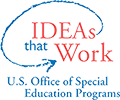Creating Effective Educators
Creating Effective Educators
The “EE” in the CEEDAR Center title is the core of our mission—to develop Effective Educators. Effective general and special education teachers, working together with leaders who support their efforts, are key to empowering students with disabilities to graduate from high school ready to begin college or their careers. Knowledgeable and skilled teachers and leaders play an essential role in student achievement; however, the systems that license, prepare, and evaluate these professionals are not always coherent or consistent. In many instances, systems are developed in response to policy without a strong foundation of evidence.
The CEEDAR Center’s efforts focus on three vital areas of systems change:
(a) licensure standards and certification, (b) teacher and leader preparation program reform, and (c) program evaluation. These three levers operate with varying degrees of functionality and impact the outcomes of students with disabilities. Most standards are intentionally broad to afford flexibility. The flexibility of standards and program diversity create challenges in defining and validating linkages between teacher and leader preparation practices and outcomes. Furthermore, professionals in leadership and teacher education programs often struggle with how to cover everything their graduates need to know for working with diverse students, including students with disabilities. Once educators exit their initial preparation programs, they often enter systems that do not support their efforts to provide multi-tiered instruction. In addition, most induction, mentoring, and professional development efforts for both teachers and leaders are insufficient for a seamless transition into the workforce. Professional development often shows limited connection to the evidence base and lacks the amount of deliberate practice and feedback necessary for individuals to become experts. Because the systems operate in isolation, professional development programs are unable to extend what was learned during initial preparation. Finally, most evaluation systems do not include specific criteria for evaluating educators’ impact on students with disabilities. Leadership evaluations are broad and rarely attend to the leaders’ roles in supporting teachers of students with disabilities. Further, systems for evaluating teachers tend to be “one size fits all” and do not take into account the needs of specific populations of students.
The CEEDAR Center promotes extended professional learning systems (PLS) that address licensure, initial preparation, ongoing development, and evaluation for all teachers and leaders. Teachers and leaders need powerful opportunities to acquire the knowledge and skills to implement evidence-based practices (EBPs). The expertise needed to be effective with students with disabilities is acquired over time and requires collaboration to purposefully align initial preparation and continuing professional development efforts. Effective educators are developed and nurtured by systems that support their learning and their work with students with disabilities. Such systems must promote a culture of professional collaboration and innovation, evaluate efforts to improve teaching and leadership, and hold teachers and leaders accountable for those evaluations.
As we partner with states to provide technical assistance (TA), we focus on ensuring that all students with disabilities are under the charge of effective educators and leaders. We support the systems to ensure teachers and leaders are committed to continuous self-improvement, ongoing collaboration, and consistent strengthening of college and career readiness for every child. The CEEDAR Center is committed to helping states develop Effective Educators.


